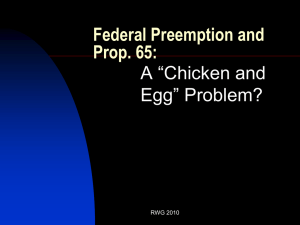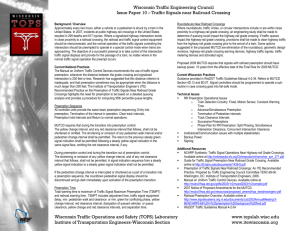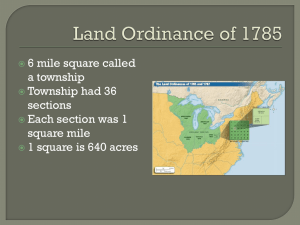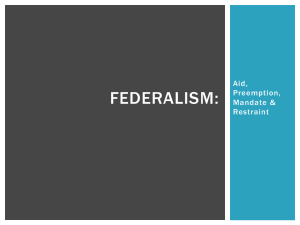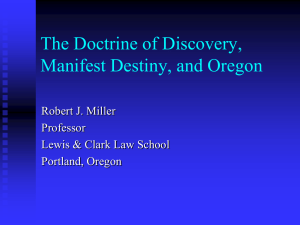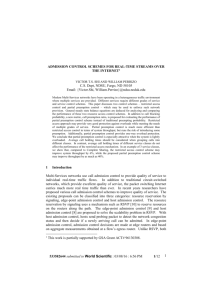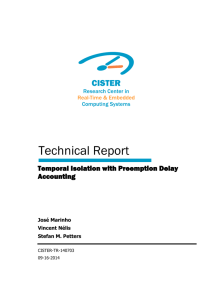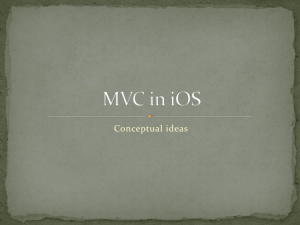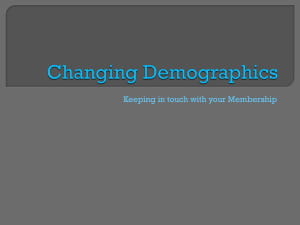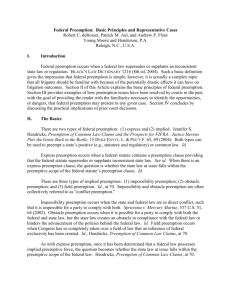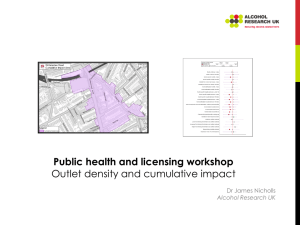The Perils of Preemption - Alcohol Policy Consultant
advertisement
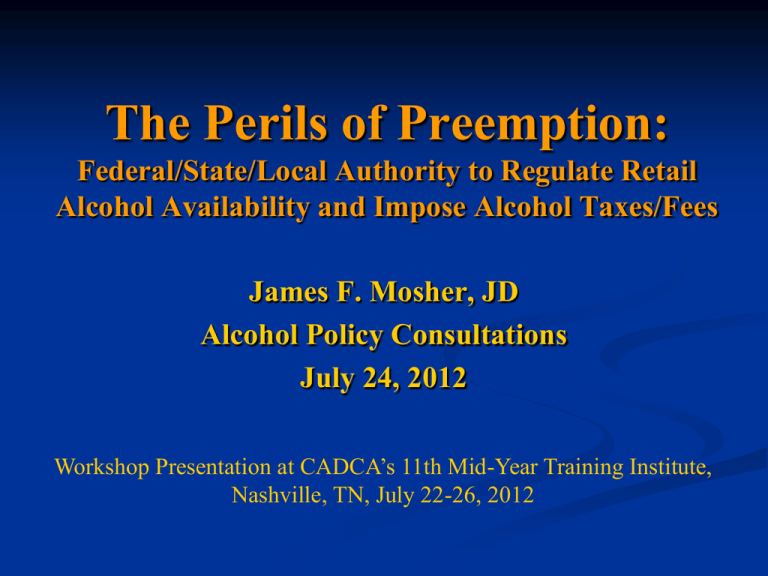
The Perils of Preemption: Federal/State/Local Authority to Regulate Retail Alcohol Availability and Impose Alcohol Taxes/Fees James F. Mosher, JD Alcohol Policy Consultations July 24, 2012 Workshop Presentation at CADCA’s 11th Mid-Year Training Institute, Nashville, TN, July 22-26, 2012 Preemption: Which Level of Government Gets to Decide? A legal term for describing the extent to which the a higher level of government limits the authority of subordinate governmental bodies. Resources will be posted on: www.alcoholpolicyconsultations.com Small Group Discussion Brainstorm two lists of preemption policies/decisions/proposals that either (1) enhance or (2) are detrimental to: public health; public safety; or social justice. Federal Preemption: Limits Found in the U.S. Constitution Tenth Amendment “The powers not delegated to the United States by the Constitution, nor prohibited by it to the States, are reserved to the States respectively, or to the people.” Federal Preemption: Limits Found in the U.S. Constitution 21st Amendment “The transportation or importation into any state, territory or possession of the United States for delivery or use therein of intoxicating liquors, in violation of the laws thereof, is prohibited. Evolution of Federal Courts’ Interpretation of the 21st Amendment Phase 1 1936-1964 • States have virtually unlimited power to regulate the alcohol trade Phase 2 1964-1980 • States must adhere to certain interstate commerce clause requirements Phase 3 1980-present • States have burden to justify restraints on interstate commerce clause requirements Concurrent sales of alcohol and gasoline A case study in the power, and peril, of State preemption “Express” and “Implied” (“conflict”, “obstacle”, “field”) Preemption A legal doctrine or a court’s smokescreen? Bar closing time case study Alcohol Outlet Density: Community Guide Summary of the Research “[T]he Task Force found sufficient evidence …to recommend limiting alcohol outlet density through the use of regulatory authority (e.g., licensing and zoning) as a means of reducing or controlling excessive alcohol consumption and related harms.” Guide to Community Preventive Services, Centers for Disease Control and Prevention, 2009. Key Dimensions of Retail Alcohol Outlet Regulation Issuance of new retail licenses (outlet density) Regulation of existing retail outlets (problem outlets) Can Local Zoning Powers Escape the State Preemption Doctrine? California State Constitution:* “The State of California … shall have the exclusive right and power to license and regulate the … sale … of alcoholic beverages within the State.” *Cal. Constitution Art. 20 §22 Levels of State Preemption Exclusive or near exclusive State authority STATE AUTHORITY State licensing; local zoning & police powers High State Preemption LOCAL AUTHORITY Joint State and local licensing Local licensing, minimum State standards Low State Preemption State Delegation of Authority California Statutory Provision:* “No retail license shall be issued … where the [issuance of the license] is contrary to a valid zoning ordinance of any county or city.” *Cal. Bus. & Prof. Code § 23790 The “Deemed Approved” Strategy The Essence of Local Zoning “The essence of zoning lies in metropolitan and regional planning; it is the use and treatment of public and private land … in the interest of the community as a whole. The factors and reasons [for] metropolitan zoning are entirely different from those which control the regulation of the [production, distribution, sale and] consumption of liquor.”* *Floresta Inc. v. City Council, 190 Cal. App.2d 599, 605 (1961). North Carolina Case Study “Except as provided in this Chapter, local ordinances establishing different rules [than those imposed by the State] on the manufacture, sale, purchase, transportation, possession, consumption, or other use of alcoholic beverages, or requiring additional permits or fees, are prohibited.” * *N.C.G.S.A. § 18B-100. North Carolina Case Study, cont. “[T]he governing board of a city or county may refuse to [renew] a [beer or wine] license if it finds that the applicant committed any act or permitted any activity in the preceding year that would be grounds for suspension or revocation of his [state] permit.”* N.C.G.S.A. § 105-113.71 Protecting Local Powers Statutory language included in the California “Lee Law,” which imposes various public health and safety requirements on alcohol retailers: “The standards set forth in this section are state standards that do not preclude the adoption and implementation of more stringent local regulations that are otherwise authorized by law.” Key Preemption Research Findings: Alcohol Outlet Regulation 1. States vary widely in extent of State preemption. 2. States assign differing levels of preemption for differing aspects of alcohol retail control. 3. Courts play a critical role in defining the extent of State preemption, and their holdings are inconsistent and unpredictable. Key Preemption Research Findings: Alcohol Outlet Regulation (cont.) 4. State preemption is a significant barrier to implementing effective alcohol outlet regulation. 5. The threat of preemption-based legal challenges by industry groups undermines the development of local alcohol outlet regulation. Key Preemption Research Findings: Alcohol Outlet Regulation (cont.) 6. Important new local land use powers can be developed even in states with broad state preemption. 7. Legal technical assistance is critical for local campaigns where state preemption may be an issue. Alcohol Taxes: Community Guide Summary of the Research “The Task force on Community Preventive Services recommends increasing the unit price of alcohol by raising taxes based on strong evidence of effectiveness for reducing excessive alcohol consumption and related harms. Public health effects are expected to be proportional to the size of the tax increase.” CDC Task Force on Community Preventive Services 2010 State Preemption: Alcohol Taxes & Fees States fall into four preemption categories: 1. Localities have broad authority 2. Some but not all localities have broad authority 3. Localities have authority but within strict state limits 4. Localities have no authority Chicago Alcohol Taxes Beer: $.04/gallon Alcohol other than beer: Up to 14%: $.36/gallon 14-20%: $.89/gallon 20%+: $2.68/gallon Ventura, California Alcohol Impact Fees $250 - $1,400 per alcohol outlet Fee rate based on type of business, sales volume, hours of sale Funds collected used to monitor and enforce local ordinance Key Preemption Research Findings: Alcohol Taxes/Fees 1. Preemption is more likely as to alcohol taxes/fees than retail alcohol outlet regulation. 2. Alcohol taxes are more likely to be preempted than fees. 3. Local governments in many states are not fully exercising their authority to impose alcohol taxes/fees. Key Preemption Research Findings: Alcohol Taxes/Fees (cont.) 4. Alcohol impact fees may provide a mechanism for local governments to cover some of the costs associated with alcohol sales. 5. Preemption legislative proposals should be anticipated when localities expand use of local taxing/fee setting authority. State Preemption: Recommendations for Community Coalitions Recruit attorneys familiar with local land use law. Assist in determining extent of local control Provide legal memoranda defending local proposals Urge State Health Departments and other statewide groups to conduct legal research on the topic. Recommendations for Community Coalitions (cont.) Work to expand/protect local authority. Oppose state legislative proposals that limit local control – beware of the “poison pill.” Demand language in state bills that explicitly protects local authority. Resources will be posted on: www.alcoholpolicyconsultations.com
